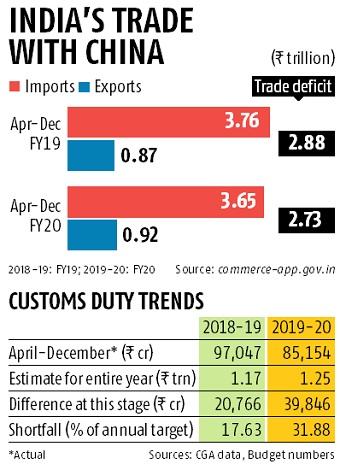India could run out of supplies in mobile phones, auto parts, insecticides and pharmaceuticals within a fortnight as the China shutdown intensifies due to coronavirus, according to government officials.
Describing the concern as grave, an official pointed out, “we do not have enough time to arrange supplies from other countries”.
While the crisis situation has prompted the government to rework the supply chains, there’s no clear road map yet on how the supply shortfall can be met in the near term at least. Officials have indicated that it’s an opportunity for India to scale up its manufacturing capabilities, but that will take time.
Besides the shortage in supplies, the government is also fire-fighting on bureaucratic procedures related to imports.
Finance Minister Nirmala Sitharaman said on Saturday that steps were likely to be taken to exempt imports of certain items from documentation, so that consignments from China get cleared fast. The emergency measure is being considered as Chinese officials, caught in tackling the deadly virus, are not able to provide the necessary paperwork for cross-border trade.
“We are studying the sectors and ports where to provide this relief on a temporary basis,” Sitharaman said, while admitting that she’s worried about the fallout of the virus on the economy.
An analysis by the Confederation of Indian Industry (CII) has estimated that China supplies 43 per cent of India’s imports of the top 20 goods. This includes mobile handsets ($7.2-billion import from China), computers ($3 billion), integrated circuits, and other inputs ($7.5 billion), fertilisers ($1.5 billion), pharma ingredient API ($1.4 billion), and antibiotics ($1.1 billion). With over 90 per cent of solar power equipment being sourced from China, 2-4 gigawatts of upcoming projects are likely to be affected, according to CII. Officials believe Customs duty would take a hit in February and March as a direct result of the coronavirus outbreak.
Sources in the Central Board of Indirect Taxes and Customs said they feared that plenty of consignments from China and even Southeast Asia were languishing in ports because of delay in clearances.
“These are imports for which papers are not arriving from China,” an official said. The importers are also paying demurrage charges at the ports which raise the costs for them. These charges are likely to be waived. Demurrage charges are levied by shipping lines on importers when they do not take delivery of the full container and move it out of the port or the terminal area within the permissible number of free days.
Opportunity for India
However, with China on shutdown mode, many companies are looking at India as an alternative destination. “Some 10-12 companies, among those searching for alternatives to China, have spoken to us, and I feel their expectations from us are quite realistic and reasonable,” said Sitharaman.
The finance minister is scheduled to meet industry bodies and trade leaders, including those from the tourism sector, about the coronavirus threat on Tuesday. She decided on these interactions after a recent meeting in Chennai, where importers flagged their concerns.
The government expects to earn Rs 1.25 trillion from Customs duty in 2019-20, according to Revised Estimates, down 19 per cent from last year’s Budget numbers.
Ajay Sahai, director general and chief executive officer, Federation of Indian Export Organisations, said any relaxation in submission of documents for imports purpose would be highly beneficial as statutory agencies have not yet commenced their full operation.
Scaling up domestic production
Meanwhile, officials from finance, commerce and other ministries are also expected to meet stakeholders to find ways on managing the coronavirus fallout. For instance, Principal Economic Advisor Sanjeev Sanyal said he would hold meetings with industry segments over the next week to strategise on overcoming the supply shortage by scaling up domestic production.
“We are going to look at ways where we can rework the global supply chain with the help of domestic manufacturers… We are also talking to other countries. It is a big opportunity for us,” Sanyal told Business Standard.
To address the supply crunch, CII has suggested leveraging the existing excess capacity in the Indian industry; rolling back import duty hike to look for alternative sources of imports; expanding credit to manufacturing units with quick loan sanctions, and one-time emergency waiver of non-performing asset regulations for three months.

Unlock 30+ premium stories daily hand-picked by our editors, across devices on browser and app.
Pick your favourite companies, get a daily email with all news updates on them.
Full access to our intuitive epaper - clip, save, share articles from any device; newspaper archives from 2006.
Preferential invites to Business Standard events.
Curated newsletters on markets, personal finance, policy & politics, start-ups, technology, and more.



)